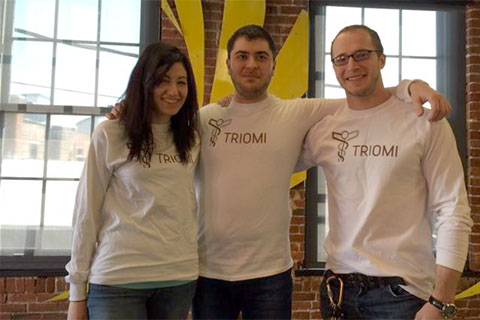Take two University of Miami engineering alumni with the pluck and ingenuity of MacGyver, a Frost School of Music program rooted in the sounds of Elvis Presley, and the life-and-death stakes of earthquake-ravaged Haiti and you’ve got the makings of potentially game-changing medical technology.
In October 2010, months after a huge earthquake wreaked havoc in Haiti, Mike Battaglia, B.S. ’09, and Sean Murphy, B.S.B.E. ’09, M.D. ’13, were volunteering in the IT department at the UM-affiliated Hospital Bernard Mevs Project Medishare in Port-au-Prince when a woman showed up complaining of chest pains. The hospital’s only EKG had broken down and a doctor asked the pair for help.
 Battaglia, a guitar player who had graduated the year before from the Frost School’s music engineering program, looked at the broken leads of the machine and realized his guitar strings might work as new wires for the device.
Battaglia, a guitar player who had graduated the year before from the Frost School’s music engineering program, looked at the broken leads of the machine and realized his guitar strings might work as new wires for the device.
“The guitar strings are basically copper. So we grabbed those, grabbed some duct tape, and walked into the ER. People are looking at us going, ‘What the heck?’’’ recalled Battaglia. “But we rigged the equipment, picked the best connection, and the doctor on call was able to get the reading.”
As it turned out, the woman was not having a heart attack. But if the machine hadn’t worked, her family was looking at a costly airlift that would have bankrupted them.
The lightbulbs went off “right away,” said Murphy, who as a student regularly carried around a list of “million-dollar ideas” for businesses he and Battaglia wanted to start one day.
“We knew by the end of the night we had something, the idea, the makings, of a portable EKG,” Murphy recounts. “We could see there was this need for a small, portable EKG you could use in a place like Haiti, that could be deployed anywhere, that could help save lives. So we started right that night to re-engineer the architecture of the EKG, to find ways to make it cheaper, make it simpler, and a couple of years later here we are.”
That was the birth of Triomi.
The startup plans to manufacture groundbreaking portable 12-lead EKG machines that can be used in developing countries as well as by doctors and nurses doing homecare in the United States.
In March, Triomi was selected for the prestigious Sprint Techstars program, receiving $120,000 in funding and a three-month “accelerator” boot camp in Kansas City for mobile health startups looking to hone their products and pitches for angel investors.
“The EKG technology was so arcane—it still had a printer built into it,” said Battaglia. “Can you imagine if your laptop had a printer built into it? We want to normalize the idea that the EKG is something every doctor can use just like the stethoscope, something they can carry around with them. That’s not a paradigm that’s possible when you’re still wheeling around an EKG with a printer attached to it.”
Colby Leider, director of the Music Engineering Technology Program at the Frost School of Music, was Battaglia’s adviser and isn’t surprised at all by the success of his former student, who also studied jazz piano with Frost School Dean Shelly Berg.
“You realize within five minutes after talking with Mike that he’s a polymath—he’s wickedly smart,” said Leider.
What the duo did with the EKG was apply many of the lessons Battaglia learned at the school’s pioneering music engineering program, which was founded by Bill Porter—Elvis Presley’s sound engineer—after he relocated to Miami in the 1970s. The program was the first of its kind and now provides graduates exposure to a wide array of companies that use sound technology like Bose, Apple, Microsoft, and Sennheiser.
“Mike talks to me constantly about how the skills that he learned in the program were about digital signal processing,” explains Leider. “There’s really nothing fundamentally different between a piece of music, looking at the structural analysis of an audio file in Pandora or Spotify, versus looking at the signal coming off an EKG from the beating of a human heart. They’re all signals—amplitude versus time.”
